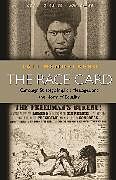The Race Card
Einband:
Kartonierter Einband
EAN:
9780691070711
Untertitel:
Campaign Strategy, Implicit Messages, and the Norm of Equality
Genre:
Politikwissenschaft
Autor:
Tali Mendelberg
Herausgeber:
Princeton University Press
Anzahl Seiten:
324
Erscheinungsdatum:
09.04.2001
ISBN:
0691070717
"By almost any definition this is a readable book. . . . Mendelberg has made a substantive contribution to our understanding of the political and cultural implications for a nation whose majority cannot seem to find a model other than white or black."---Kenneth O'Reilly, Journal of Southern History
Autorentext
Tali Mendelberg
Klappentext
Did George Bush's use of the Willie Horton story during the1988 presidential campaign communicate most effectively when no one noticed its racial meaning? Do politicians routinely evoke racial stereotypes, fears, and resentments without voters' awareness? This controversial, rigorously researched book argues that they do. Tali Mendelberg examines how and when politicians play the race card and then manage to plausibly deny doing so. In the age of equality, politicians cannot prime race with impunity due to a norm of racial equality that prohibits racist speech. Yet incentives to appeal to white voters remain strong. As a result, politicians often resort to more subtle uses of race to win elections. Mendelberg documents the development of this implicit communication across time and measures its impact on society. Drawing on a wide variety of research--including simulated television news experiments, national surveys, a comprehensive content analysis of campaign coverage, and historical inquiry--she analyzes the causes, dynamics, and consequences of racially loaded political communication. She also identifies similarities and differences among communication about race, gender, and sexual orientation in the United States and between communication about race in the United States and ethnicity in Europe, thereby contributing to a more general theory of politics. Mendelberg's conclusion is that politicians--including many current state governors--continue to play the race card, using terms like "welfare" and "crime" to manipulate white voters' sentiments without overtly violating egalitarian norms. But she offers some good news: implicitly racial messages lose their appeal, even among their target audience, when their content is exposed.
Inhalt
List of Illustrations vii
List of Tables ix
Preface xi
PART ONE: THE ORIGIN OF IMPLICIT RACIAL APPEALS 1
Chapter 1. A Theory of Racial Appeals 3
Chapter 2. The Norm of Racial Inequality Electoral Strategy and Explicit Appeals 28
Chapter 3. The Norm of Racial Equality Electoral Strategy and Implicit Appeals 67
PART TWO: THE IMPACT OF IMPLICIT RACIAL APPEALS 109
Chapter 4. The Political Psychology of Implicit Communication 111
Chapter 5. Crafting Conveying and Challenging Implicit Racial Appeals: Campaign Strategy and News Coverage 134
Chapter 6. The Impact of Implicit Messages 169
Chapter 7. Implicit Explicit and Counter-Stereotypical Messages: The Welfare Experiment 191
Chapter 8. Psychological Mechanisms: The Norms Experiment 209
PART THREE: IMPLICATIONS OF IMPLICIT RACIAL APPEALS 237
Chapter 9. Implicit Communication beyond Race: Gender Sexual Orientation and Ethnicity 239
Chapter 10. Political Communication and Equality 268
References 277
Index 299

Leider konnten wir für diesen Artikel keine Preise ermitteln ...
billigbuch.ch sucht jetzt für Sie die besten Angebote ...
Die aktuellen Verkaufspreise von 6 Onlineshops werden in Realtime abgefragt.
Sie können das gewünschte Produkt anschliessend direkt beim Anbieter Ihrer Wahl bestellen.
Loading...
Die aktuellen Verkaufspreise von 6 Onlineshops werden in Realtime abgefragt.
Sie können das gewünschte Produkt anschliessend direkt beim Anbieter Ihrer Wahl bestellen.
| # | Onlineshop | Preis CHF | Versand CHF | Total CHF | ||
|---|---|---|---|---|---|---|
| 1 | Seller | 0.00 | 0.00 | 0.00 |
